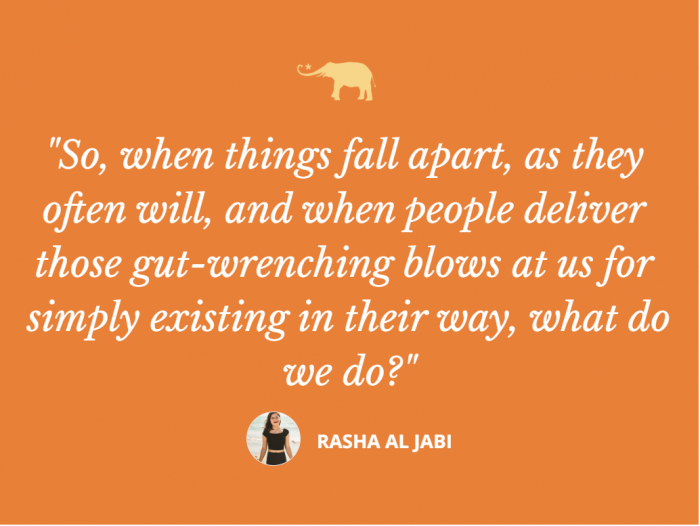~
I have recently been confronted with a challenging situation that shook my ego to its core.
In a country that is still foreign and alien to me—where I am trying to grapple with all the everyday life changes I need to adjust to—amidst a crashing economy and a global pandemic, to say it was a gut-wrenching feeling is inadequate. But I can’t find the right words to describe how I feel. At least not yet.
It happened exactly seven minutes right before I was scheduled for my weekly therapy session. Things were said. There was great judgment and bitterness toward my character, livelihood, and lifestyle. It was harsh, cruel, and insulting.
As I stood there, adrenaline kicking, listening to the words that were being thrown—in a futile attempt to defend myself—I was transported back to the time when I was 16—when I first heard these exact same insults, character-bashing, judgment, and attacks.
But when I checked in with my therapist—fives minutes late to my session—and she asked me to take a moment to feel my body on the chair and my feet on the ground, all I said was, “I feel absolutely nothing.”
In the complex-trauma world, this incredible ability to feel absolutely nothing is called dissociation, and it is one of our greatest defense mechanisms we share with other mammalians to shut down in the face of a threat—whether real or perceived—or in response to a past trigger and an old, painful wound.
Spiritual growth can be painful, and choosing to remain committed, awake, and consistent on this path can feel like a sudden ripping to the rawest, most vulnerable, and softest part of our soul. And because we understand that our dharma is to continue watching the unfolding of our ego, the false projections of our identity, and to simply accept that we’re never in control, the pain that comes with this unfolding can feel excruciating, too.
Even when we’re committed to our own growth, even when we try to become the best version of ourselves, even when we do the hard work of healing our shadow self, it will never change what people think of us.
It will never make us immune to judgment, criticism, false accusations, or misinterpretations of who we truly are. And it will still hurt—every single time.
With every blow, I wanted to crawl back into my old, familiar cocoon. I wanted to make myself small, shrink, and disappear.
I wanted to become invisible.
But, as we all know, once we decide to step out of our own habitual patterns and old cocoons, going back is never an option, as the only reason we might have stepped out in the first place is having realized that nothing great ever grows there. Perhaps only black molds that slowly start to permeate every inch of our soul.
As I begin to integrate this experience into my psyche, I realize that I feel disappointed, sad, and embarrassed. I feel ashamed that we live in a world where close people sometimes treat us as their enemies.
So, when things fall apart, as they often will, and when people deliver those gut-wrenching blows at us for simply existing in their way, what do we do?
We brace ourselves hard—not with cowardice or fake bravado—but with our own raw and simple open heart, and then we show up for ourselves.
We stand up for ourselves without denying the excruciating pain we might be carrying.
We feel all the feels, as one of my close friends used to say. We put one foot in front of the other. We carry our heads up high. We show up, fully.
We remember the transcendental essence and beauty that can potentially come with that spiritual ripping—the falling apart and the falling together of our wounded, little pieces.
We take refuge in the remembrance of all the wise people who walked this path before us, and who understood that in those moments of excruciating pain and loneliness—when we feel absolutely nothing—going back to sleep is not an option.
“The breeze at dawn has secrets to tell you.
Don’t go back to sleep.
You must ask for what you really want.
Don’t go back to sleep.
People are going back and forth across the doorsill,
where the two worlds touch.
The door is round and open.
Don’t go back to sleep.” ~ Rumi


 Share on bsky
Share on bsky





Read 22 comments and reply